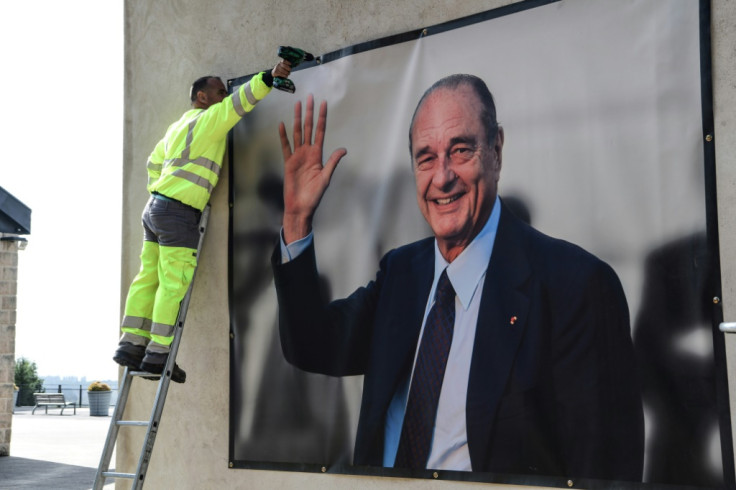Jacques Chirac, former French president dies aged 86
The centre-right Chirac, acknowledged even by foes as a canny political fighter, rose to prominence as mayor of Paris before becoming prime minister and then president.
Former French president Jacques Chirac died on Thursday at the age of 86 after a long battle with deteriorating health, prompting tributes from across the political spectrum for a charismatic statesman who famously said "non" to the 2003 Iraq war.
The centre-right Chirac, acknowledged even by foes as a canny political fighter, rose to prominence as mayor of Paris before becoming prime minister and then serving as head of state from 1995 to 2007.
Former opponents and supporters hailed his common touch and enduring popularity, while world leaders including German Chancellor Angela Merkel and Russian President Vladimir Putin acclaimed his service to France.
President Emmanuel Macron announced a day of national mourning for Monday, when a mass will take place at the Saint-Sulpice church in Paris.
"We French have lost a statesman whom we loved as much as he loved us," Macron said in an address to the nation from the Elysee Palace, hailing Chirac as a "great Frenchman" who had "embodied" France.
Macron and his wife Brigitte visited Chirac's Paris home on Thursday evening to pay tribute to the body of the former leader.
Chirac's time at the Elysee Palace saw France adopt the euro single currency and, in a landmark moment for relations with Washington, loudly oppose the US-led invasion of Iraq in 2003.
This infuriated US president George W. Bush and British prime minister Tony Blair, who pushed the invasion even without a United Nations mandate.
Macron praised Chirac for leading an "independent and proud France, capable of rising up against an unjustified military intervention."
And Blair hailed Chirac as "a towering figure in French and European politics over many decades."
His death was announced by his son-in-law Frederic Salat-Baroux, who told AFP he had died on Thursday morning at his home in Paris "surrounded by his family, peacefully."
Hundreds flocked to the Elysee Palace on Thursday evening to pay tribute and write in a condolence book underneath a large picture of Chirac.
Despite the long queue, many took their time to write a detailed tribute to the former president, such as 23-year-old engineer Pierre Etienne, who called Chirac "a fervent defender of Franco-African relations".
"My admiration and tenderness for the last of the great presidents," wrote another well-wisher.
Meanwhile, the operator of the Eiffel Tower said its lights would be switched off from 1900 GMT to honour the former president.
Mixed legacy
Chirac's death prompted intense discussions about Chirac's legacy to France, with commentators united in admiration of his wily political skills and homely style, but divided on what he achieved.
As a student he had been a Communist party activist, and as a right-leaning politician he was known for his ideological flexibility, with economic policies that fluctuated -- as did his views on European integration.
While he was hailed for standing up to the far right -- he defeated the National Front candidate Jean-Marie Le Pen for his 2002 re-election -- he was also capable of fuelling France's deep-rooted racial tensions.
"Having Spaniards, Poles and Portuguese people working here creates fewer problems than having Muslims and blacks," he said in a speech in 1991.
His legacy is also overshadowed by a conviction for graft dating to his time as mayor of Paris from 1977 to 1995.
After losing his presidential immunity, he became the first former head of state to go on trial in 2011 and was given a suspended jail term.
"He's someone with a mixed record," political historian and author Jean Garrigues told AFP, adding that there was "a large reserve of goodwill towards him from the French people."
The beer-loving charmer, whose extramarital affairs were an open secret, had barely been seen in public in recent years. He suffered a stroke in 2005 and underwent kidney surgery in December 2013.
Chirac's 12 years in the Elysee Palace made him France's second longest-serving postwar president, after his Socialist predecessor Francois Mitterrand.
Macron's Socialist predecessor Francois Hollande praised Chirac as a "fighter" who had "known how to establish a personal link with the French".
"He incarnated a France that was true to its universal values and to its historic role," said former president and one-time protege Nicolas Sarkozy.
Putin said Chirac was a "wise and far-sighted statesman" and also singled out "his intellect and huge knowledge".
'Honest man'
It was Chirac's time at the helm of the French capital that resulted in his conviction in December 2011 for embezzlement and misuse of public funds.
He contested the ruling but did not appeal it, saying the French people "know who I am: an honest man" who worked only for "the grandeur of France and for peace."
A politician with a popular touch who loved the company of farmers, Chirac also deployed his charm and acid tongue on supporters and foes.
Caught on an open mic discussing Britain with his German and Russian counterparts in 2005, he was famously overheard saying that "one cannot trust people whose cuisine is so bad."
He said just before leaving office: "There have been women I have loved a lot, as discreetly as possible."
burs-adp-js-sjw/dl/har
Copyright AFP. All rights reserved.

This article is copyrighted by International Business Times, the business news leader



















